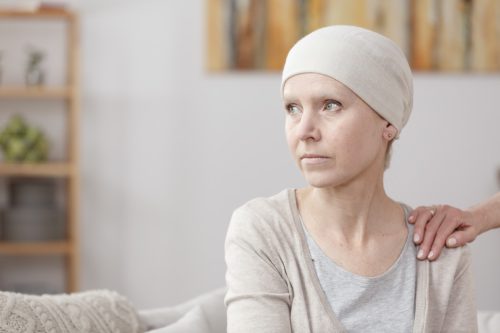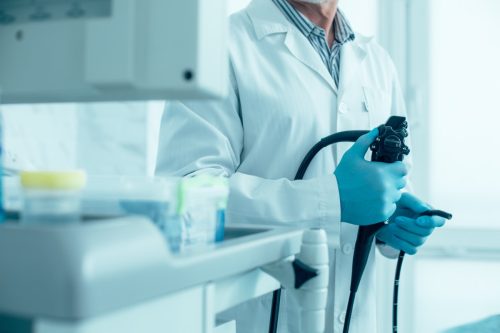Colorectal Cancers Are Spiking in People Under 55—These Are the First Signs

An alarming new report from the American Cancer Society showed that approximately 20 percent of new colorectal cancer diagnoses in 2019 were in patients under the age of 55. That’s a jump from 11 percent in 1995—and what’s more, they report, about 60 percent of those diagnosed in 2019 already had advanced stages of the disease. In 1995, when screening for colorectal cancers was less common, only 57 percent of cases were late-stage at diagnosis.
Colorectal cancer, or CRC, is quite common: The American Cancer Society says it’s the third most commonly diagnosed cancer and the third-leading cause of cancer deaths in the U.S. Over the past two decades, they note, the incidence of CRC has decreased among people age 65 and older. However, this is not true for those under 65.
While this uptick in colorectal cancers among young people is certainly cause for concern, knowing the early symptoms of the disease, as well as getting screened regularly, may help ease your mind—and could even end up saving your life. Read on to find out what signs to be on the lookout for, and why doctors say some patients drag their feet when it comes to scheduling a screening.
READ THIS NEXT: Men Who Eat This Are at 29 Percent Higher Risk of Colorectal Cancer, New Study Finds.
Colorectal cancers are becoming more common in younger people.

“While outcomes for colorectal cancer have been improving over the past few decades, it is concerning that there has been a rise in diagnoses among younger patients,” says Shivan Mehta, MD, the Associate Chief Innovation Officer at Penn Medicine and an associate professor of Gastroenterology at the Perelman School of Medicine at the University of Pennsylvania. “As a result of that, the guidelines for routine screening have actually changed so instead of age 50, everyone is now recommended to start getting screened at age 45, regardless of having symptoms,” he tells Best Life.
Rebecca Siegel, lead author of the report and the senior scientific director of surveillance research at the American Cancer Society, said the latest statistics about colorectal cancers emphasize the need for screening. “We know rates are increasing in young people, but it’s alarming to see how rapidly the whole patient population is shifting younger, despite shrinking numbers in the overall population,” she said in a statement. “The trend toward more advanced disease in people of all ages is also surprising and should motivate everyone 45 and older to get screened.”
These are the symptoms to watch for, doctors say.

Not surprisingly, certain signs of colorectal cancer may first crop up in the bathroom, but others might be more unexpected. Mehta says that “red flag symptoms” include “blood in stool, abdominal pain, change in bowel habits, or weight loss.”
“Symptoms of colon cancer include bloating, nausea, abdominal pain, diminished appetite, weight loss, a change in bowel habits (especially new constipation), blood in the stool, or iron-deficient anemia (which means a low red blood cell or ‘hemoglobin’ level related to blood and iron loss from tumor-related bleeding in the bowel),” says Charles Schneider, MD, a medical oncologist at Penn Medicine’s Abramson Cancer Center and a clinical professor of Hematology-Oncology at the Perelman School of Medicine at the University of Pennsylvania.
If you’re experiencing any of these, it’s important to bring your symptoms to the attention of your healthcare provider—even if you feel embarrassed about it.
Some people are reluctant to get screened for colorectal cancers.

Doctors recommend getting screened annually for colorectal cancers beginning at age 45—but certain people should get tested sooner, Schneider says. “Screening for colon cancer is primarily accomplished by colonoscopy beginning at age 45 for the general population, or beginning at a younger age for people with relatives who have had colon cancer,” he explains. “For people with a family history of colorectal cancer, screening should begin 10 years earlier than the age of colon cancer diagnosis in the family member.”
We probably all know someone, however, who is putting off scheduling a colonoscopy (maybe ourselves!). When we asked Schneider why people may be reluctant to put that appointment on the calendar, he said that “the most common reason is a misunderstanding that colonoscopy is an uncomfortable, invasive procedure,” and was eager to set the record straight.
“The procedure is actually very easy and ‘pain free,’ since most gastroenterologists will use medicines to make patients ‘sleepy’—known as ‘conscious sedation,'” he explained. “The bowel prep, required to clean out any stool from the colon the day and night before the procedure, is necessary so the gastroenterologist can see the inside of the bowel clearly and remove any polyps that are present. The prep will cause a lot of diarrhea, which is uncomfortable for sure, but short-lived.”
For more health news sent directly to your inbox, sign up for our daily newsletter.
Regular cancer screenings can be life-saving.

If you’re due for a colonoscopy, either because of your age or because you have a family history of the disease, Mehta and Schneider urge you not to put it off. “Often competing priorities in life or work get in the way,” says Mehta. “Many people are OK with getting screened, but they need a small nudge or an easy opportunity to get scheduled just to participate. Those that do get screened reduce their chances of dying from colorectal cancer, as it can be treated well if found early.”
“Screening with colonoscopy is the best way to prevent colon cancer, since [more than] 90 percent of colon cancers start in a polyp which, if removed before the polyp transforms into a cancer, is life-saving,” adds Schneider.